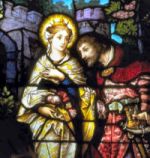Make your gift today!
Help keep Catholics around the world educated and informed.
Already donated? Log in to stop seeing these donation pop-ups.
The Father William Most Collection
Notes on Astronomy from the Works of Hugh Ross
[Published electronically for use in classes taught by Fr. Most and for private theological study.]
Notes from Hugh Ross, Creation and Time, NAV Press, 1994 (Box 3500l Colorado Springs, CO 80925 (Phone 1-800-366-7788)
p.127: "The confidence expressed by non-Christian astrophysicists in God as the explanation for the cosmos shot up dramatically in 1992. On April 24, headlines around the globe announced [p.129] observations of tiny ripples in the radiation left over from the big bang. George Smoot, project leader for the COBE experiment (Cosmic Background Explorer, the satellite that recorded these observations), declared, ‘What we found is evidence for the birth of the universe.’ he added,’ Its like looking at God’...... Steven Hawking said, ‘It is the discovery of the century, if not of all time.’ These findings established two facts: (1) that the background radiation must come from the remote recesses of space and time, and (2) that the specific entropy of the universe must be enormous. ....Denial of theism among astronomers is now rare, and even the few dissenters hint at the strength of the evidence. Geoffrey Burbidge, astronomer at the University of California, San Diego, and a self--proclaimed atheist, berates his fellow astronomers [p.131] for rushing to join ‘the First Church of Christ of the Big Bang.’ [p.128] ‘Earlier, agnostic Robert Jastrow described the path traveled by his fellow astronomers as (p.116, God and the Astronomers, WW Norton, 1978) scaling the mountains of ignorance....conquering the highest peak....pulling over the final rock...[to be] greeted by a band of theologians who have been sitting there for centuries."
Earlier, Hugh Ross in The Fingerprint of God, described the great efforts of astronomers to avoid finding a beginning to the universe--until the 1992 discovery forced them to reconsider.
Ross, in The Creator and the Cosmos (2d ed. 1993,NavPress) explains that the specifications of the universe are such that not much variation could be had without making the universe impossible: Life molecules could not be made without just the right quantities.. If the strong nuclear force were weak, positrons and neutrons would not stick together. If it were much stronger, protons and neutrons would have such an attraction for each other that not one would remain alone If that force were 2% weaker or .03% stronger life would be impossible. Not only must there be the right number of nucleons but also the precise number of electrons-- or life could not exist. There are numerous other requirements, detailed by Ross in the chapter "A Just Right Universe."






